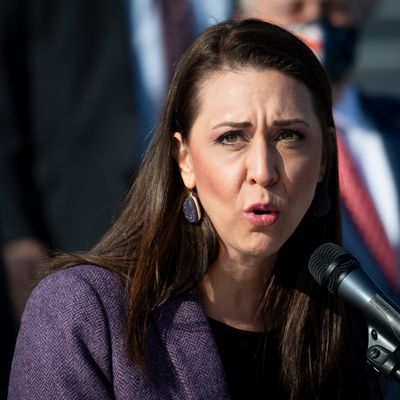
What was generally expected to be a quick Saturday afternoon verdict in the second impeachment trial of Donald Trump was suddenly disrupted. In the morning, House impeachment managers announced they wanted to call Republican representative Jaime Herrera Beutler as a witness following news reports that she had been aware of mid-riot incriminating comments by Trump via a phone call with House Minority Leader Kevin McCarthy. The Senate responded by voting in favor of bringing in witnesses.
Herrera Beutler, who was one of ten House Republicans to vote for impeachment on January 13, has been taking about her conversation with McCarthy for days, but made her willingness to tell Congress about it pretty clear in a tweet last night:
Subpoenaing Herrera Beutler would cast light on the key point of Trump’s state of mind during the assault on the Capitol, since apparently Trump profanely pushed back on McCarthy’s efforts to bring the assailants to heel, essentially suggesting the rioters cared more about stopping the election certification than insufficiently courageous Republicans in Congress itself.
When lead House impeachment manager Jamie Raskin announced this morning that he wanted to call Beutler as a witness, lead Trump lawyer Michael van der Veen, who was clearly (only) ready to make his closing argument, pitched a fit (subsequently earning a rebuke from Leahy for his language). Van der Veen threatened to call “a hundred witnesses … to my office in Philly-delphia” to be deposed (including, he said, Nancy Pelosi).
The Senate initially voted 54-46 to support admission of witnesses, with Republican senators Susan Collins, Lisa Murkowski, Mitt Romney, and Ben Sasse joining the Democrats. (It’s a key shift from the first Trump impeachment trial, where Republicans blocked additional evidence.) Subsequently, Lindsey Graham, who had been warning he would call many witnesses — including Vice-President Kamala Harris — if the door was opened to new evidence, switched his vote to favor the motion, perhaps to reinforce his earlier threat.
After the vote, Chuck Schumer issued a quorum call, the usual way for the Senate to buy time to figure out next steps. But whatever happens next the decision to open the door the witnesses will slow down the trial’s conclusion, perhaps by days. The trial’s organizing resolution makes it clear that depositions and discovery are required if witnesses are called:
If the Senate agrees to allow either the House of Representatives or the former President to subpoena witnesses, the witnesses shall first be deposed and the parties shall be allowed other appropriate discovery. The Senate shall decide after deposition and other appropriate discovery which, if any, witnesses shall testify, pursuant to the Rules of Impeachment. No testimony shall be admissible in the Senate unless the parties have had the opportunity to depose such witnesses and to conduct other appropriate discovery.
Although the Senate has now approved calling witnesses generally, individual witness calls will each require a majority vote from the Senate, unless there’s some sort of bipartisan deal. Perhaps some agreement will let the trial conclude in a timely matter, but Saturday morning’s developments threw quite a curveball. The big news before Raskin’s announcement was that Mitch McConnell was telling friends he would vote for acquittal today. Bill Cassidy of Louisiana, who voted earlier in the week to allow the trial to continue, also seemed to have flipped back to support for acquittal. Now the preordained conclusion has been delayed if not changed.






























